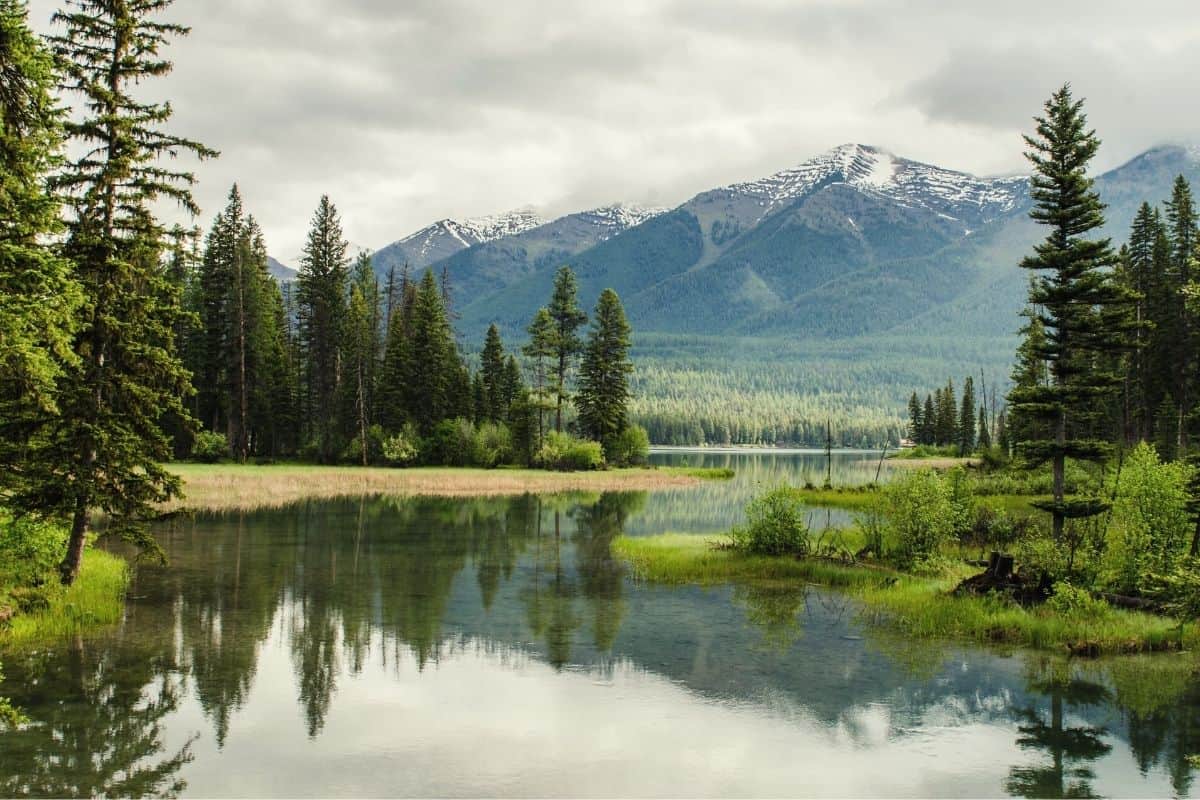Venturing outdoors can be a messy endeavor, but you can transform your backpacking trips from funky to fresh by adding just one little, low-cost item to your pack: soap.
However, not all soaps are fit for outdoor forays, least of all those containing synthetic chemicals that may harm the natural environment. If you’re keen to keep things clean on your trips in the great outdoors but want to limit your environmental impact, then biodegradable soap is the only way to go.
From our field testing Dr. Bronners is our top choice – it’s biodegradable ingredients leave no trace, and its soapy lather works well whether you’re shaving, washing dishes or cleaning you’re whole body.
Keep reading to discover what biodegradable soap is, the best biodegradable liquid soap and bar soap on the market, how to choose a bio soap, the benefits of switching away from conventional soaps, and how to use any soap responsibly outdoors.
Table of Contents
- What is Biodegradable Soap?
- Which are the Best Biodegradable Soaps?
- How to Choose the Best Biodegradable Soap for Your Needs?
- Why You Should Use Biodegradable Body Wash, Soaps, & Shampoos?
- What Are the Benefits of Using Environmentally Friendly Soap?
- How to Dispose of Camping Soap Suds Responsibly?
- How To Clean If You Decide Not To Use Soaps?
- Final Thoughts
What is Biodegradable Soap?
Biodegradable camping soap is one that can be broken down or decomposed by bacteria or other living organisms. Unlike many popular hand or dish soaps, bio soap is efficiently decomposed (eliminated or reduced to negligible amounts) by organic soil.
How Do Biodegradable Soaps Compare to Traditional Soaps?
Unlike biodegradable soaps, traditional soaps often contain synthetic (man-made) chemicals. Many of these harmful chemical preservatives, such as parabens, phthalates, and petrochemicals, along with synthetic fragrances, do not break down quickly.
If they are disposed of in nature, traces of their chemical makeup can still exist many years later. The negative impact potential on local flora and fauna is considerable, and that is why traditional suds should never be used while camping.
Most biodegradable washes, conversely, are produced with natural, organic ingredients that break down when exposed to the bacteria found in natural environments. These concentrated solutions can also provide suitable cleaning power with drastically less product.
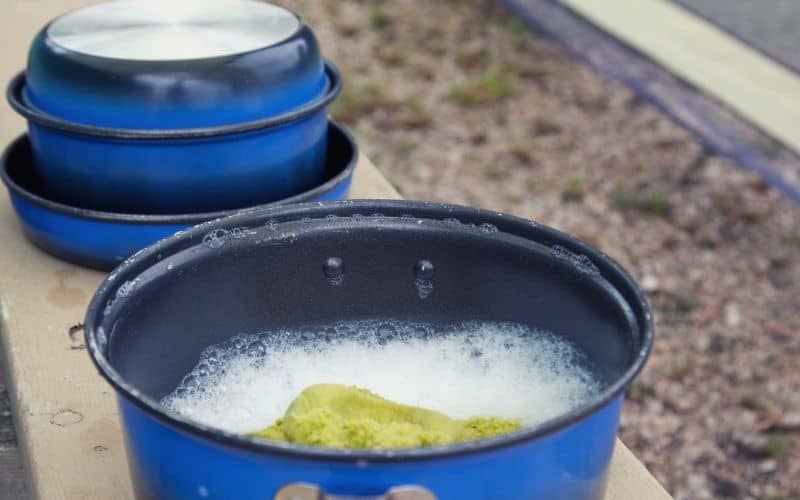
Which are the Best Biodegradable Soaps?
Picking the right biodegradable soap is easy with our list of field-tested brands below.
- Dr. Bonners Liquid Soap
- Campsuds
- Wilderness Wash
- Dr. Bronners Bar Soap
- Sea to Summit Pocket Hand Wash Sheets
1. Dr. Bronners
Dr Bronners has long been considered the best biodegradale soap out there amongst outdoor travelers and eco-conscious consumers alike.
Over the years, Dr. Bronners has amassed a cult-like following with products that feature organic and certified fair-trade ingredients like peppermint oil, helianthus, and coconut oil.
Dr Bronner comes in a variety of versions, too. These include pure-castile liquid soap, baby unscented, tea tree, lavender, and pretty much everything else except a standard bar soap!
Their famous 18-in-1 philosophy is a testament to the versatility of their soaps. Not only is Dr. Bronners an ethical choice, but it also doubles up as detergent, shaving cream, dish soap, hand wash, hand sanitizer, body wash, and, believe it or not, an insect repellent.
Dr Bronner comes in a variety of versions, too. These include pure-castile liquid soap, baby unscented, tea tree, lavender, jojoba oil, and many more!
What Others Thought
- Joe Jackson from Outside: “It imbued whatever it was cleaning with a nice dose of peppermint.”
- Alex Beale from 99 Boulders: “…an industry leader in social responsibility.”
- University of Vermont: “Dr. Bronners does all they can to create a quality product with as little negative impact as possible.”
2. Campsuds Biodegradable Concentrated Soap
Sierra Dawn Products’ CampSuds has been the pioneer for concentrated, multi-use, biodegradable washes since 1968. Today it is one of the most trusted brands out there.
CampSuds uses ingredients derived from vegetables and plants and contains no palm oil or potassium hydroxide, so the “environmentally friendly” box is well and truly ticked.
Our testers all found it great for washing dishes, hair, and sensitive skin, and using as a laundry detergent, and noted that just a few drops of the product go a long way. A few more options scent-wise would have scored additional marks, but the liquid’s light, fresh scent is hard to dislike.
You can find these iconic green bottles in most outdoor supply stores and they are typically the most affordable option.
What Others Thought
- Joe Jackson from Outside: “Campsuds left both the dishes and the shirt clean, with minimal scrubbing on my part.”
- REI: “…works in hot, cold or salt water to wash just about anything. Just a few drops gives quick, effective suds.”
3. Wilderness Wash Soap
Sea-To-Summit’s Wilderness Wash is another backcountry-ready, biodegradable camp soap that’s hugely popular in the outdoor world.
Like the others, it’s concentrated, so only 1 or 2 drops are necessary for a nice, foamy lather, and it has multiple uses. You can use it for personal hygiene, dishwashing, laundry, and pretty much any other cleaning task. The citronella version also features essential oils and fragrance oils that help deter bugs.
The only notable downside to the Wilderness Wash is that it’s not quite as effective as Dr B’s when it comes to odor-ousting. While most found it worked well as a shower wash, more fragrant testers noted it didn’t quite subdue their body odor after a hard day on the trails.
This biodegradable shampoo and soap comes in a very packable 3 fl. oz. bottle, making it ideal for long-distance backpacking. The brand also make rinse bathing wipes if you want something a little more luxe.
What Others Thought
- Joe Jackson from Outside: “…an excellent dish and laundry soap for a camp environment but was the worst at cutting down on odors.”
- Daniel Oates from Trailspace: “If you need body wash, shampoo or to clean your pots while out in the backcountry, this is for you.”
- Sea to Summit: “…goes a long way and is gentle on fabrics and skin, yet effective on dishes and laundry stains.”
4. Dr Bronners Bar Soap
According to our testers, the best biodegradable soap bar for outdoor adventures is Dr Bronners Pure-Castile Bar Soap.
These bars do everything the liquid soap does and are every bit as harmless for both the user and the environment. They can serve as a body wash, shampoo, dish soap, shaving foam, and more, so versatility is a big selling point. They’re also made with certified Fair Trade and organic ingredients and are free of synthetic preservatives.
So, bar or bottle? This comes down to personal preference, but on their hikes two of our testers found Dr Bronners bars more convenient thanks to their small packed size, the reduced risk of spillage, and the fact that they could simply cut the bar in half (or smaller) for shorter trips.
What Others Thought
- Katherine Englishman from Field Mag: “…a great all-in-one camp soap that’s easy to pack in, clean up, and carry out.”
- REI: “Ideal for camping.”
- Chris Myers from Trailspace: “An all-in-one soap that has quickly become my favorite.”
5. Sea to Summit Pocket Hand Wash Sheets
Sea to Summit’s Pocket Hand Wash Sheets are among the best biodegradable soaps out there for campers or backpackers who are keen to minimize bulk and weight.
If soap bars or liquid soaps are too bulky and heavy for you, these are well worth trying. Our testers all agreed that they lack the versatility and cleaning power of liquid soaps. However, most said they would be willing to accept this compromise on trips where pack space is severely limited.
Sea to Summit also make a Laundry Wash, Body Wash, and Shaving Soap version of these sheets, but carrying all four on a trip would largely negate the benefit of choosing just one over a standard bar or liquid soap – i.e. the pack’s light weight and teeny size. In any case, our field testers found that the handwash sheets could be put to other uses with just a little ingenuity.
What Others Thought
- Alex Beale from 99 Boulders: “For washing hands and dishes these soap sheets work well.”
- Sea to Summit: “50 leaves of pure, dry soap so there’s no risk of leakage in your luggage or pack, or having it confiscated by airport security.”
How to Choose the Best Biodegradable Soap for Your Needs?
Choosing the right soap comes down to deciding which type of soap you need and whether to go for a scented or unscented option.
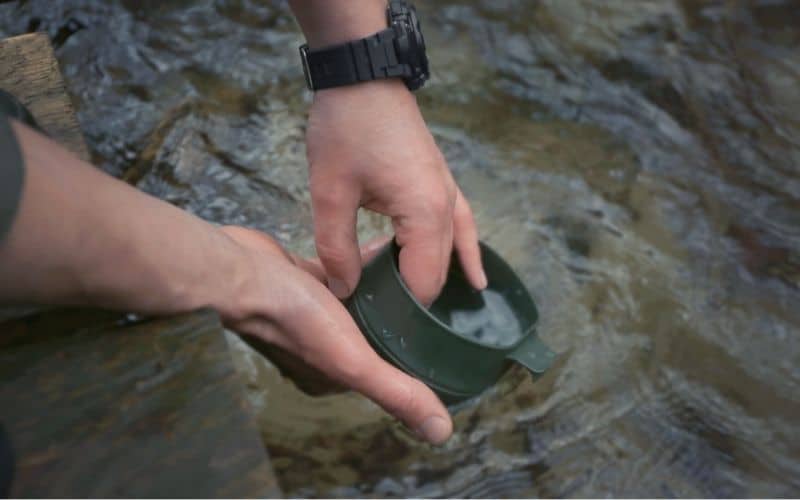
Types of Biodegradable Soap
Choosing the correct type of biodegradable soap for your needs can be categorized by format (liquid, bar or sheets) and what function it needs to perform.
Of the three, liquid soaps like Dr Bronners and Campsuds are the most convenient and versatile – just squeeze a few drops on your skin, hair, dirty clothing, dishes, etc., add a little water, and a few rubs later you’ll have a healthy lather to clean with. Bar soaps and soap sheets, on the other hand, aren’t quite so user-friendly but have the advantage of being far more packable and lightweight.
As far as function goes, all of our testers preferred liquid and bar soaps over sheets. Sure, some of the reported 18 uses for products like Dr. Bronners bar and liquid soaps are a little far-fetched (toothpaste, really?), but there’s no denying they excel in a wider variety of tasks. Sheets, conversely, are only really good for a single stated purpose, i.e. laundry, showering, shaving, etc., so lack versatility.
Scented vs. Unscented Soap
Choosing a scented or unscented soap comes down to a tradeoff between masking odors and the risk of attracting curious wildlife.
The benefits of scented soap are fairly obvious – they mask the less pleasant smells emanating from our body and also leave our laundry, dishes, or whatever else we wash with them smelling peachy/minty/etc.
The downsides? For this, we’ll hand you over to our friends at the National Parks Service, who say “All food, garbage, toiletries, and any odorous item that may attract a bear must be stored in an Interagency Grizzly Bear Committee (IGBC) approved bear-resistant food canister when not in immediate use, day and night.”
Those “odorous items”, of course, also include soap and clothing freshly washed with scented detergent. The bottom line: if you’re heading into bear country, unscented is the way to go. If not, the choice between the two is entirely yours.
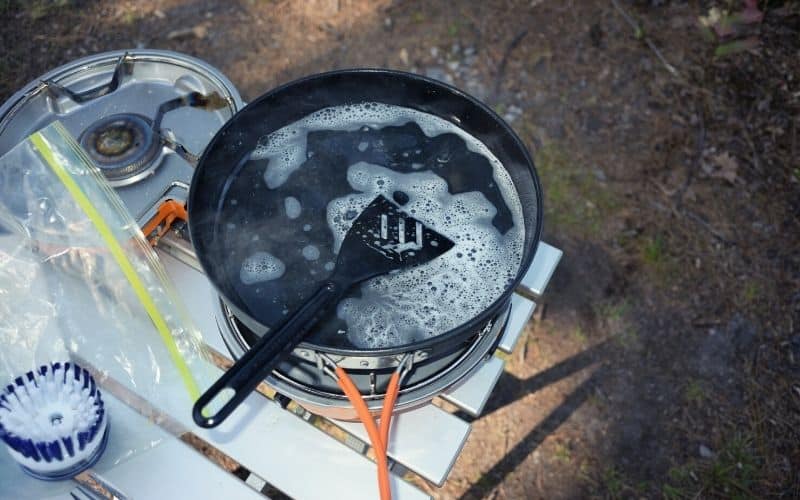
Why You Should Use Biodegradable Body Wash, Soaps, & Shampoos?
The main reason you should use biodegradable, eco-friendly soaps in the outdoors is to minimize environmental impact and for your own health. According to the EPA, “Cleaning products can present several health and environmental concerns…Using green cleaning products can help to reduce the human health and environmental concerns that come with cleaning.”
Even the highest quality, all-natural, organic biowashes can negatively affect the environment, especially aquatic species. Nevertheless, the impact of bio soaps is negligible compared to standard shower gels, shampoos, and handwashes, and even smaller compared to regular laundry detergents, dish detergents, and all-purpose cleaners, all of which many bio soaps can substitute.
Following strict guidelines for the use and disposal of bio soap helps us remain responsible and aligned with Leave No Trace (LNT) principles.
What Are the Benefits of Using Environmentally Friendly Soap?
The main benefits of using bio soaps are given below.
- Lesser Environmental Impact
- Extended Use Out of a Single Bottle
- Healthier Ingredients
1. Lesser Environmental Impact
The main benefit of eco-friendly soaps is reduced environmental impact.
The very nature of a biodegradable substance means that it will become virtually undetectable over time (when disposed of properly). Unlike other harmful chemicals or plastics, bio washes pose very little threat to existing vegetation or plant life, and significantly less risk to aquatic species.
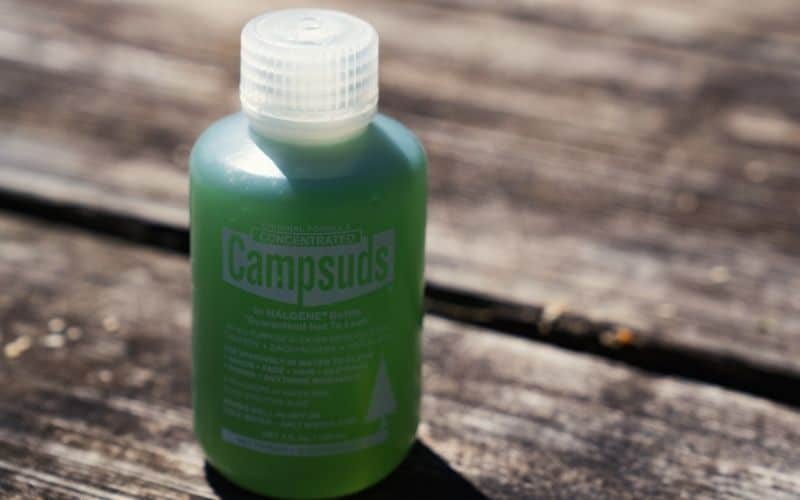
2. Extended Use Out of a Single Bottle
Biodegradable washes’ concentrated format is a huge advantage for backpackers, allowing you to get more washing done ounce of product than with regular soaps. A 3 fl. oz. bottle of concentrated wash, for example, might last you a week of backpacking, whereas the same amount of a traditional wash might not last a day.
A bonus of being in concentrated form is you only need to bring a very small bottle. (Photo by Tony Webster / CC BY 2.0)
3. Healthier Ingredients
Another big ‘pro’ of using bio soaps is that they’re healthier for humans, too.
If you already pay close attention to the ingredients that make up what you eat and drink, why not extend this monitoring to the cleansers and lotions that you place on your skin? Chemical-laden suds can contain known carcinogens and skin irritants.
How to Dispose of Camping Soap Suds Responsibly?
Despite biodegradable soaps’ lack of harmful ingredients, they should still be disposed of responsibly following leave-no-trace principles.
There is a common misconception among many hikers, backpackers, and campers that biodegradable suds don’t pollute the environment. As a result, these folks pay little attention to how much they are using, where they are using it, or how they dispose of it.
Using any soaps near or within any water source is a serious violation of LNT practices. It carries numerous environmental and marine wildlife impacts that cannot be reversed.
Do not shower, wash your face, or do your dishes with soaps in any river, lake, or stream. Instead:
- Carry the necessary water for your cleaning tasks in a bottle, hydration reservoir, or collapsible bucket to a site that is at least 200 feet from any fresh water source.
- Use your suds sparingly – 1 to 4 drops is more than sufficient in most cases as most bio washes are highly concentrated.
- Consider digging a cathole into which you can pour your ‘grey water’. This surrounds the soap with the organic soil compounds that aid efficient decomposition. It also helps to prevent potential surface runoff during rainfall.
- It is acceptable to disperse small amounts of grey water in a wide arc (slinging the water out of your pot instead of pouring it). This method prevents the concentrated pouring of the entire solution in one spot and saves you from having to dig a cathole.
How To Clean If You Decide Not To Use Soaps?
Cleaning yourself and your kit in the backcountry without soap is possible with potable water and some naturally found items. If you decide to go soapless when handling your hygiene needs in the backcountry, consider some of the following strategies.
- Go for a swim! As long as you’re not heavily covered with bug sprays or sunscreens, taking a dip in a fresh body of water is one of the best ways to stay refreshed and clean sans suds and scrubbing.
- Use biodegradable soap sheets to give yourself a good wipe down – just make sure to pack them out!
- Sand, dirt, or pine needles can provide the abrasive qualities needed to clean grubby dishes. Simply rinse with fresh water when you have removed the heavy soot or food debris.
- Protect yourself from sun exposure and bugs with clothing and/or netting, as opposed to lotions and sprays. Permethrin-treated or UV-protected clothing helps limit the amount of bug spray or sunscreen you need to clean from your skin each night, further reducing your need for suds on the trail.
Final Thoughts
Most of us like to keep up a certain level of hygiene, even when we set up camp in the back of beyond. Eco-friendly soap allows us to do just that. By following a few simple rules for using this type of soap out in the wild we can stick to the LNT principles and preserve the great outdoors for everyone that follows us!
If you liked this post, give us a shout in the comments box below. And please feel free to share it with your friends!
